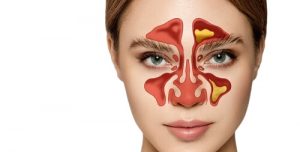Are you tired of enduring the excruciating agony caused by unbearable sinus tooth pain? If so, you’re not alone in this distressing battle against discomfort. This article aims to shed light on the vexing issue of sinus tooth pain, providing insights into why sinus pain, its causes, symptoms, and potential remedies.
Join us as we explore the world of dental afflictions and uncover effective ways to relieve pain from this unbearable ache.
Understanding the Connection Between Sinus Issues and Tooth Pain
Unbearable sinus tooth pain is a discomfort that perplexes many, often blurring the line between dental and sinus issues. Understanding the intricate relationship between sinus health and tooth pain is essential for effectively managing and treating tooth pain. Exploring the link between sinus problems and toothache:
- Proximity of Sinuses to Upper Teeth: The roots of the upper teeth, especially the molars, are located near the maxillary sinuses. Inflammation or infection in these sinuses can pressure the tooth roots, leading to sinus tooth pain.
- Symptoms of Sinusitis Inducing Tooth Pain: Sinus issues like sinusitis often cause pain in multiple upper teeth, a constant ache that intensifies with movement. The pain typically accompanies other sinusitis symptoms like nasal congestion, pressure around the nose, and a sore throat.
- Sinus Infections and Dental Discomfort: Sinus infections can lead to an accumulation of mucus and increased sinus pressure, causing discomfort that radiates to the dental region. This can mimic toothache, making diagnosis challenging.
- Differentiating Between Sinus Tooth Pain and Dental Problems: While sinus issues can cause tooth pain, it’s crucial to distinguish this from pain due to dental problems such as tooth decay or gum disease. Persistent or isolated tooth pain without sinus symptoms may indicate a dental health issue.
- Impact on Oral Health: Chronic sinusitis or repeated sinus infections can impact oral health, causing prolonged periods of discomfort and affecting the quality of life.
- Consulting Healthcare Professionals: Accurate diagnosis of sinus-related tooth pain often requires consulting both a dentist and a doctor, as treatment may involve addressing both sinus and dental issues.
Identifying the Symptoms: When Sinus Issues Affect Your Teeth
Understanding how sinus issues can manifest as dental pain is crucial in distinguishing them from tooth decay and other dental problems. When sinuses become inflamed or infected, they can cause distinct symptoms that affect the teeth, particularly the upper molars. Recognising these symptoms is key to seeking the right treatment. Key symptoms indicating sinus-related tooth pain:
- Pain in Multiple Upper Teeth: Sinusitis often causes dull, throbbing pain in multiple upper back teeth simultaneously, which is uncommon in typical dental problems that usually affect a single tooth.
- Increased Discomfort with Movement: Sinus-related tooth pain often worsens with certain movements, such as bending over or jumping, due to the shift in sinus pressure.
- Pressure Around the Nose and Cheeks: A feeling of pressure or fullness around the sinus cavities, particularly under the eyes and around the nose, often accompanies sinus-induced tooth pain.
- Nasal Symptoms: Congestion, runny nose, or a feeling of mucus build-up in the nasal passages are common with sinus issues and can coincide with tooth discomfort.
- Sensitivity to Hot and Cold: Teeth affected by sinus pressure may become more sensitive to temperature changes, similar to regular tooth pain.
- Pain Intensification with Sinusitis: For those with a history of sinusitis, tooth pain may flare up during sinus infections, indicating a link between the two conditions.
- Other Related Symptoms: Sore throat, headaches, and facial tenderness are other symptoms that often accompany sinus-related tooth pain.
Home Remedies and Immediate Relief Techniques for Sinus Tooth Pain
 Dealing with sinus tooth pain can be distressing, but several home remedies and techniques can provide immediate relief. These methods aim to reduce sinus pressure and inflammation, alleviating sinus toothache and discomfort. Effective strategies for alleviating sinus-induced tooth pain:
Dealing with sinus tooth pain can be distressing, but several home remedies and techniques can provide immediate relief. These methods aim to reduce sinus pressure and inflammation, alleviating sinus toothache and discomfort. Effective strategies for alleviating sinus-induced tooth pain:
- Saline Nasal Wash: A saline rinse can help clear the nasal passages, reduce mucus build-up, and alleviate sinus pressure, contributing to tooth pain.
- Steam Inhalation: Inhaling steam, perhaps with a few drops of eucalyptus or peppermint oil, can open up the nasal passages, decreasing sinus pressure and easing tooth discomfort.
- Warm Compresses: Applying a warm compress to the face, particularly over the sinus areas, can help to soothe inflammation and relieve the pressure that affects the teeth.
- Hydration: Drinking plenty of fluids, especially warm beverages, can thin mucus and promote sinus drainage, reducing pressure on the teeth.
- Elevating the Head: Sleeping with the head elevated can prevent mucus from pooling in the sinuses, thus reducing pressure on the upper teeth.
- Over-the-counter Medications: Non-steroidal anti-inflammatory drugs (NSAIDs) like ibuprofen can help reduce inflammation and pain. Decongestants may also be effective in relieving sinus pressure.
- Avoiding Irritants: Reducing exposure to allergens and irritants such as smoke and strong fragrances can prevent worsening sinus issues and subsequent tooth pain.
- Chewing Gum: Chewing sugar-free gum can help equalise sinus pressure, providing some relief from the pain.
- Spicy Foods: Consuming spicy foods can stimulate mucus flow, aiding sinus drainage and reducing pressure on the teeth.
- Consulting with a Professional: While these home remedies can provide temporary relief, it’s important to consult a healthcare professional if the pain persists or is severe.
When to Seek Professional Medical Help for Unbearable Sinus Tooth Pain
While home remedies can often provide relief for sinus-induced toothache and pain, there are situations where professional medical intervention becomes necessary. Understanding when to seek help is crucial for effective treatment and prevention of further complications. Indicators for seeking medical assistance:
- Persistent Pain: If sinus tooth pain persists for over a few days without improvement, even after trying home remedies, it’s time to consult a healthcare professional.
- Intensifying Symptoms: Increasing severity of symptoms, such as unbearable pain, swelling in the sinus areas, or worsening nasal congestion, indicates a need for professional evaluation.
- Fever and General Ill-Health: A fever or feelings of general malaise alongside sinus tooth pain can be signs of a more serious infection requiring medical attention.
- Difficulty Breathing: Difficulty or discomfort in breathing, especially if accompanied by chest pain, is an urgent matter that needs immediate medical care.
- Discoloured Nasal Discharge: Thick, discoloured nasal discharge or blood-tinged mucus can indicate a bacterial infection, which may require antibiotic treatment.
- Toothache Unrelated to Sinus Issues: If the toothache persists even after sinus symptoms have subsided, it could indicate a separate dental problem that needs attention from a dentist.
- Recurring Episodes: Frequent recurrences of sinus tooth pain, especially if they’re increasingly severe, warrant a professional evaluation to determine underlying causes and appropriate treatment.
- No Relief from Over-the-counter Medication: In cases where over-the-counter pain relief medications and decongestants fail, seeking medical advice is advisable.
Long-Term Strategies to Prevent Recurrence of Sinus-Related Toothaches
 Preventing the recurrence of sinus-related toothaches involves more than just addressing immediate symptoms. It requires a long-term approach focused on maintaining sinus health and minimising factors contributing to sinusitis-induced tooth pain issues. Certain lifestyle changes and preventive practices can significantly reduce the likelihood of experiencing these painful episodes. Effective strategies for preventing sinus-related tooth pain:
Preventing the recurrence of sinus-related toothaches involves more than just addressing immediate symptoms. It requires a long-term approach focused on maintaining sinus health and minimising factors contributing to sinusitis-induced tooth pain issues. Certain lifestyle changes and preventive practices can significantly reduce the likelihood of experiencing these painful episodes. Effective strategies for preventing sinus-related tooth pain:
- Regular Nasal Hygiene: Regular nasal washing or saline sprays can help keep the sinuses clear, reducing the chances of infection and inflammation.
- Allergen Management: For those susceptible to allergies, managing exposure to allergens through air purifiers, hypoallergenic bedding, and staying indoors during high pollen counts can help prevent sinus flare-ups.
- Adequate Hydration: Staying well-hydrated thins mucus in the sinuses, promoting better drainage and reducing pressure on sinus walls and adjacent teeth.
- Balanced Diet and Vitamins: A diet rich in vitamins, especially Vitamin C, and anti-inflammatory foods can bolster immune health, aiding in preventing sinus infections.
- Avoid Smoking and Alcohol: Smoking and excessive alcohol consumption can worsen sinus health. Avoiding these substances can help maintain healthy sinuses.
- Regular Dental Check-Ups: Regular visits to the dentist can ensure any dental issues that might exacerbate sinus problems are addressed promptly.
- Use of Humidifiers: In dry environments, using a humidifier can add moisture to the air, preventing the drying out of sinus passages, which can lead to inflammation.
- Stress Management: Chronic stress can weaken the immune system; hence, incorporating stress-reducing activities like exercise, yoga, or meditation can indirectly help prevent sinus issues.
- Prompt Treatment of Colds and Flu: Addressing colds and flu promptly can prevent them from escalating into sinus infections.
- Consult Healthcare Professionals Regularly: Regular check-ups with healthcare professionals, including ENT specialists, can help in the early detection and management of sinus issues.
In conclusion, unbearable sinus tooth pain can significantly impact our daily lives, causing immense discomfort and hindering our ability to do even the simplest tasks. Seeking immediate medical attention is crucial to diagnose and treat this condition properly. Furthermore, taking preventative measures such as practising good oral hygiene and avoiding triggers can help reduce the likelihood of experiencing unbearable sinus inflammation pain. Remember to consult a healthcare professional to determine the underlying cause of your sinus tooth pain and receive the appropriate treatment to find relief and regain control of your life.
If you’re struggling with unbearable sinus tooth pain, it’s important to take swift action. At Emergency Dentist Perth, we are here to provide you with the immediate care and expert guidance you need. Whether it’s a recurring sinus issue impacting your dental health or an urgent dental concern, our team is equipped to offer you the best possible treatment and relief.
Don’t let sinus-related toothaches disrupt your life. Reach out to us at (08) 9783 9006 for prompt, professional assistance. We’re dedicated to addressing your dental emergencies with the utmost care and expertise, ensuring you get back to comfort and wellness. Call us today and take the first step towards resolving your dental pain effectively and efficiently.
References
Sinusitis and tooth pain – Mayo Clinic
https://www.mayoclinic.org/diseases-conditions/acute-sinusitis/multimedia/sinusitus-and-tooth-pain/img-20186076
Sinus Toothache: Causes, Symptoms, and Treatments
https://www.healthline.com/health/dental-and-oral-health/sinus-toothache
Nonodontogenic “tooth pain” of nose and sinus cavity origin
https://pubmed.ncbi.nlm.nih.gov/26762708/
Sinusitis (sinus infection) – NHS
https://www.nhs.uk/conditions/sinusitis-sinus-infection/
Sinusitis, dental infection or both – UT Health San Antonio
https://news.uthscsa.edu/sinusitis-dental-infection-or-both/


Recent Comments